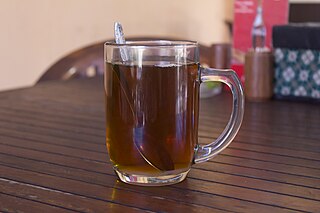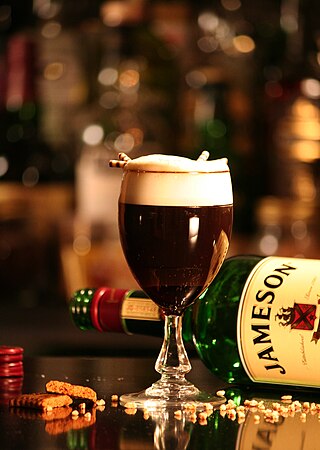
An alcopop is any of certain mixed alcoholic beverages with relatively low alcohol content, including:
- Malt beverages to which various fruit juices or other flavorings have been added
- Wine coolers: beverages containing wine to which ingredients such as fruit juice or other flavorings have been added
- Mixed drinks containing distilled alcohol and sweet liquids such as fruit juices or other flavourings

A drink or beverage is a liquid intended for human consumption. In addition to their basic function of satisfying thirst, drinks play important roles in human culture. Common types of drinks include plain drinking water, milk, juice, smoothies and soft drinks. Traditionally warm beverages include coffee, tea, and hot chocolate. Caffeinated drinks that contain the stimulant caffeine have a long history.

Smirnoff is a brand of vodka owned and produced by the British company Diageo. The Smirnoff brand began with a vodka distillery founded in Moscow by Pyotr Arsenievich Smirnov (1831–1898), but its modern incarnation traces back to the 1930s, by American liquor distributor Heublein. Distributed in 130 countries, it is manufactured in different countries depending on market, but is not currently produced in Russia or, indeed, anywhere in Eastern Europe.
A wine cooler is an alcoholic beverage made from wine and fruit juice, often in combination with a carbonated beverage and sugar.

Eggnog, historically also known as a milk punch or an egg milk punch when alcoholic beverages are added, is a rich, chilled, sweetened, dairy-based beverage. It is traditionally made with milk, cream, sugar, egg yolks, and whipped egg whites. A distilled spirit such as brandy, rum, whiskey or bourbon is often a key ingredient.

Advocaat or advocatenborrel is a traditional Dutch alcoholic beverage made from eggs, sugar, and brandy. The rich and creamy drink has a smooth, custard-like consistency. The typical alcohol content is generally between 14% and 20% ABV. Its contents may be a blend of egg yolks, aromatic spirits, sugar or honey, brandy, vanilla, and sometimes cream. Notable makers of advocaat include Warninks, Bols, Darna Ovo Liker, DeKuyper, and Verpoorten.
WKD, pronounced as Wicked, is a brand of alcopop produced by Beverage Brands. It is sold and heavily marketed in the United Kingdom and Ireland with the slogan ‘Have you got a WKD side?’, and also in many countries in mainland Europe. AC Nielsen ranked it as the number-one UK ready to drink (RTD) alcopop in 2006. In December 2014 to comply with alcohol tax laws and to minimise future tax increases, "Alcoholic Mix WKD" replaced the old "Original WKD", and the old Original Mix is now no longer available in both the UK and Ireland. The small change to the alcohol element of the WKD was not intended to change the taste of the product and still contains triple distilled vodka. In addition, it contains an alternative alcohol base to minimise tax. The actual recipe remains unchanged. The WKD bottling facility in Ayrshire, Scotland closed in November 2022 due to rising costs.

Flavored fortified wine or tonic wine is inexpensive fortified wine that typically has an alcohol content between 13% and 20% alcohol by volume (ABV). They are made from various fruits with added sugar, artificial flavor, and artificial color.

A liqueur coffee is a caffeinated alcoholic drink that consists of a shot of liqueur, mixed with coffee. It is typically served in a liqueur glass, often accompanied with cream and sugar. Coffee liqueur beverages are served in different fashions and can be found throughout many countries. One of the most popular liqueur coffee beverage is commonly known as Irish coffee. Liqueur coffee beverages are largely classified as cocktails as well as digestifs which are aimed at aiding the digestive process typically after a meal.

Chūhai, an abbreviation of "shōchū highball" (焼酎ハイボール), is an alcoholic drink originating from Japan.

Canned coffee is a pre-brewed version of the beverage, sold ready to drink. It is particularly popular in Japan, South Korea, and elsewhere across Asia, and produced in a number of styles and by a large number of companies. Canned coffee is available in supermarkets and convenience stores, with large numbers of cans also being sold in vending machines that offer heated cans in the autumn and winter, and cold cans in the warm months.

Vodka Cruiser is a line of brightly coloured vodka-based alcoholic beverages primarily sold in Australia and New Zealand. Sometimes described as an alcopop, this premixed drink is available in seventeen flavours, including guava, lemon, lime, passion fruit, pineapple, raspberry, and other flavours depending on location. The product originates from New Zealand, and is produced by Asahi Premium Beverages, formerly known as Independent Liquor.
Heublein Inc. was an American producer and distributor of alcoholic beverages and food throughout the 20th century. During the 1960s and 1970s its stock was regarded as one of the most stable financial investments, earning it inclusion in the Nifty Fifty.
−196 °C Strong Zero is a brand of chūhai produced by Suntory Global Spirits. It is currently sold in Japan, Taiwan, the Philippines, Australia, the United States, and the United Kingdom. As with other types of chūhai, it is available in a variety of different flavors, and is often sold at convenience stores and through vending machines. The "strong" portion of the name comes from the fact that the drinks have relatively high alcohol content. The "zero" refers to what the manufacturer calls "sugar-free". According to nutrition labelling standards in Japan, a beverage product can be labelled as sugar-free as long as it does not exceed 0.5 g of sugar per 100 mL.

High Noon is an American alcoholic beverage brand specializing in hard seltzer made with vodka and fruit juice. Introduced in 2019 by American wine and spirits company E & J Gallo Winery, High Noon is the top-selling spirit brand by volume in the United States as of 2023.










